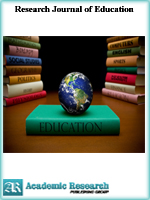Research Journal of Education
Online ISSN: 2413-0540
Print ISSN: 2413-8886
Print ISSN: 2413-8886
Quarterly Published (4 Issues Per Year)

Archives
Volume 1 Number 3 October 2015
Investigating the Contribution of the Gwanda Community Share Ownership Trust to Educational Development in Gwanda District of Matabeleland South Region in Zimbabwe
Authors: Tshuma Reuben
Pages: 27-34
Abstract
The study primarily sought to assess the contribution of the Gwanda Community Share Ownership Trust to educational development in Gwanda District in Matabeleland South Province. The Community Share Ownership Trusts (CSOTs)were introduced by the Government of Zimbabwe through the Indigenization and Economic Empowerment Act Chapter 14:33 and the Statutory Instrument 21 of 2010 that provided for the establishment of Community Share Ownership Trusts to empower the poor indigenous Zimbabweans living close to the mines but have been deprived of the right to directly and indirectly benefit from the mineral resources. The mandate of the CSOT was to secure shareholding participation by the local communities in foreign owned mines exploiting the local communities’ mineral resources and for the communities to use the proceeds from the shares to fund projects such as educational development in order to facilitate their social, economic and general improvement of their livelihood. The study preferred the qualitative method for collecting in-depth data through interviews, observations and document analysis. The study revealed a tremendous socio-economic development that directly and indirectly contributed to the educational development for the Gwanda rural indigenous communities within a very short period. These direct and indirect contributions to educational development included the provision of educational facilities such as additional classrooms, furniture and five ‘A’ Level Science laboratories, health care facilities, clean bore hole water and rehabilitation of irrigation schemes that have enhanced the educational development of the local communities. The study recommended that the Community Share Ownership Trust be adopted as a model for the provision of educational projects in those areas that are endowed with natural resources in Zimbabwe. The study also recommended that the GCSOT assist the Ministry of Education in sourcing science teachers by providing some incentives to lure adequately qualified science teachers to come and teach science in these laboratories. The study further recommended that the GCSOT establish fund raising strategies to sustain the GCSOT against the possibility of the seed money drying up.
Integrating Moral and Ethical Values In the General Studies Syllabus at Advanced Level Secondary School in Tanzania: Challenges and Opportunities
Authors: Ernest S. Kira ; Sotco C. Komba
Pages: 21-26
Abstract
This study sought to achieve two specific objectives: First, to examine the challenges of teaching and learning moral and ethical values at advanced level secondary school in Tanzania and, secondly, to recommend ways of improving moral and ethical values among the youth. The study involved 80 students and 12 teachers, randomly selected from 4 secondary schools found in Morogoro Municipality. The data were collected using interviews, focus group discussions and review of curriculum materials. The findings were as follows: First, it was revealed that the teaching of moral and ethical values in schools faced a number of challenges, including lack of role models, inadequate human and material resources, and weaknesses of the content of the syllabus in use. Secondly, the respondents recommended that for the teaching of moral and ethical values to be effective, a tripartite of stakeholders, including teachers, parents, and the general public should work collaboratively. In light of these findings, it is recommended that the entire society and parents in particular, should serve as role models to ensure that children are both morally and ethically upright as they are brought up.



